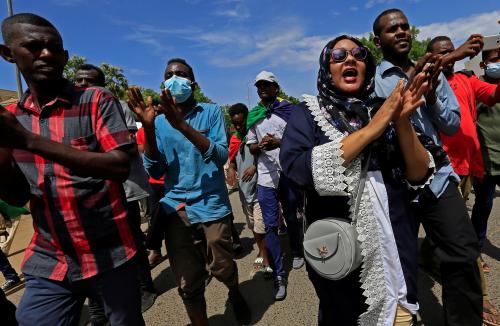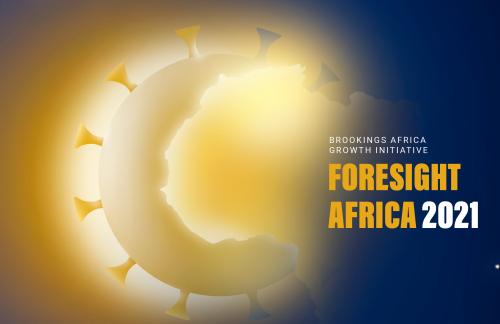South African President Cyril Ramaphosa visits West Africa
This week, South African President Cyril Ramaphosa visited Nigeria and Côte d’Ivoire as part of his seven-day tour of West Africa, a trip that will also include Ghana and Senegal next week. Before leaving Johannesburg, Ramaphosa stressed the importance of garnering investments in South Africa from West Africa. “We want to increase the confidence in our own companies operating in those countries,” Ramaphosa said. “We want to sign deals.” According to News24, at the same time, South African ministers have been discussing as many as five new agreements and memorandums of understanding (MOUs) with their Nigerian counterparts. Meanwhile, the president’s stop in Côte d’Ivoire on Thursday resulted in 10 MOUs covering trade and diplomatic relations between the two nations.
Omicron variant of coronavirus triggers travel ban against southern Africa; China pledges 1 billion additional vaccines to Africa; and J&J makes vaccine deal with South African manufacturer
Following the discovery of a new SARS-CoV-2 variant, omicron, in South Africa and its subsequent categorization as a “variant of concern” by the World Health Organization on November 26, up to 70 countries, including the United States, instituted travel bans and restrictions on several countries in southern Africa. While the travel ban was intended to limit the spread of the omicron variant, genomic sequencing has since revealed that the variant had been present in Europe days prior to South Africa’s detection of the variant. One such case in Belgium had no direct travel to southern Africa, but had just returned from a trip to Egypt.
Although some governments consider travel bans to be a vital public health measure to curb the spread of the new variant, many scientists assert that travel bans alone may only delay the spread of a pathogen. In response to the travel bans, South African President Cyril Ramaphosa expressed concern that such measures will exacerbate the economic damage of the pandemic in southern Africa—a sentiment shared by fellow leaders in the region, such as Malawi’s President Lazarus Chakwera. Moreover Salim Abdool Karim, professor for global health in epidemiology at Columbia University, considers the ban a “outrageous” overreaction, and Saad Omer, director of the Yale Institute of Global Health, warns that such strong measures could disincentivize scientific transparency given the political repercussions for being the first to announce a new variant or disease.
In related news, on Monday, Chinese President Xi Jinping, speaking at the Forum on China-Africa Cooperation (FOCAC), pledged to deliver an additional 1 billion doses of COVID-19 vaccines to the African region: More specifically, 600 million doses will be donated and 400 million doses will be produced jointly by Chinese companies and African countries. To date, China has supplied Africa with approximately 200 million doses. Xi also promised to “build 10 health projects in Africa and send 1,500 health experts” on the continent.
Furthermore, on Tuesday, South African pharmaceutical company Aspen Pharmacare signed a nonbinding preliminary agreement with Johnson and Johnson (J&J) to package, price, and sell the J&J COVID-19 vaccine under its own brand name: Aspenovax. Currently, Aspen Pharmacare has been packaging (i.e., “fill and finish”) nearly 300 million doses a year of the vaccine at their facility in South Africa. Notably, the deal does not constitute a full technology transfer that allows Aspen Pharmacare to manufacture the vaccine outright, but, rather, gives it the right to distribute and price the vaccine.
Pro-democracy protests in Sudan and Eswatini continue
On November 21, Sudanese Prime Minister Hamdok and General Abdel Fattah al-Burhan signed an agreement reinstating Hamdok and issuing the release of political prisoners after the military coup on October 25. However, the deal was not accepted by protestors, and thousands took to the streets openly denouncing Hamdok following the announcement. In response, Hamdok vowed that the new government would be a “technocratic government” and that the new cabinet would focus on holding elections by June 2023 to complete the “transition to democracy.” So far, 43 people have been killed in clashes with security forces.
In other pro-democracy efforts, citizens in Eswatini have continued protests over the past six months, demanding democratization, civil liberties, and greater participation in the economic and political affairs of the kingdom. Protests began in May of this year, triggered by the death of law student Thabani Nkomonye while in police custody. In October, Eswatini stopped all city and town municipalities from issuing permits to hold protests due to increasing violence. In an attempt to encourage national dialogue, President Cyril Ramaphosa of South Africa traveled to Eswatini last month to engage directly with King Mswati III. The president’s trip resulted in the king agreeing that the Southern African Development Community (SADC) Secretariat and the government of Eswatini would work closely to draft the terms of reference for the national dialogue.
For more on protests and citizen dissatisfaction see, “Governance in Africa: Citizen dissatisfaction is growing, and COVID-19 is likely to reverse recent gains” from Foresight Africa 2021.






Commentary
Africa in the news: Ramaphosa visits West Africa, omicron-induced travel ban provokes backlash, and protests in Sudan and Eswatini continue
December 4, 2021